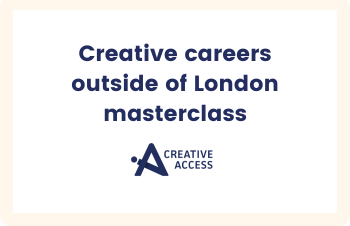The first masterclass of the year was held at the award-winning news and media powerhouse ITN. Put together by the brilliant former Creative Access alumna Hila May, the event offered a unique insight into the world of broadcast journalism
The legendary Jon Snow kicked off last night’s masterclass, making an appearance to give an inspiring introduction into the necessity of diversity in journalism to a packed audience of over 100 students, alumni and current interns. He was glad to see that Britain is finally “waking up to a massive talent that has been neglected among minorities in particular”, recognising that “Channel 4 is beginning to lead the way and are proud to be doing that”.

Masterclass Chair, Girsh Juneja, started things off with a discussion on what drives people to get into the newsroom. After joining Channel Four in the “last millennia”, he revealed that “the great thing about journalism is that you get to pursue what you’re interested in.” He enjoys seeing what motivates people in the newsroom, reminding budding reporters in the room: “don’t lose sight of what drove you to get into journalism in the first place”. After first joining ITN in the mailroom handing reporters their scripts, Girish recalled the excitement he felt when finally in the newsroom, describing the feeling that “this was it”. Now Senior Producer, he demonstrates how anyone can start anywhere in journalism and work their way up.

Creative Access alumna and Assistant News Editor Hila May embarked on her journey into journalism after first arriving at Creative Access five years ago via an internship at Mentorn Media which gave her experience working on Question Time. After working at 5News for a number of years, she joined Channel 4 two years ago, bringing exciting fresh perspective to the editorial team. Hila spoke about how she creates content on culture pieces, delivering media that “Channel 4 needed for younger audiences”. While she had to “fight to get cultural stories out there” at the beginning of her career, she now finds that “I don’t have to fight so much anymore”.

Multimedia journalist Zahra Warsame spoke about entering journalism later on than her peers and not letting that deter her. She emphasised that “people have different journeys into journalism” and that “every journey can be different”. Like Girish, when she arrived at ITN, she knew that this was what she wanted to do. Zahra encouraged aspiring journalists to “find the little gap to see what you can personally do” and write about something no one else is reporting on. She also imparted wise words on writing in a world obsessed with the next viral content. She advised us that “you have to have a news sense in journalism. Don’t go in with an idea that’s just supposed to be controversial and go viral, because eventually it loses you your journalistic integrity.”

Channel 4 reporter Symeon Brown also had a great story on how he got into journalism and the nature of the industry. Viewing journalism as “part of storytelling”, his career started by getting “bored of other people telling stories” and not being the one to pursue them. Like Zahra, he advises aspiring journalists to “have something others don’t have”. Symeon’s most successful piece includes a viral drill track that uses real quotes from MPs that employ violent rhetoric. This prompted a vital discussion into language, politics and hypocrisy in the nation. Lastly, Symeon imparts the knowledge that “journalism is a transactional industry; it relies on the transaction of stories and ideas”, encouraging people to utilise their distinctive backgrounds and bring their own ideas to the table.

Last and by no means least, we had the privilege of hearing the Head of Foreign News at Channel 4, Liliane Landor speak. She began with the motivational advice: “If I can do it, each and every one of you can do it too.” Liliane first started off at the BBC in 1989, becoming a controller for languages at the BBC World Service. The most important thing she learned here was to “find a mentor, someone you can trust, who is open and honest and will give you good feedback and learn from them”. Her own mentor gave her a piece of advice she has never forgotten: “Always keep your eye on the horizon”. Liliane certainly did so and has become a defining figure in the world of journalism. She advises our interns to “never box yourself in and go out of your comfort zone. there’s a great deal more to us than the place we are from and the languages we speak.”

Following the introductions, the Chair opened up the floor to questions. When asked about how to pitch an article, Liliane said the first things she does is look at the Twitter feed of the person sending her the email to make sure they’re authentic. The panel spoke about public engagement with their pieces with Gurnish reassuring the audience that they let people see and check their work to avoid mistakes with most pieces been seen by the journalist, a lawyer and a duty editor.
The women on the panel were asked how they navigate a traditionally male world. Zahra said she had been inspired by other women to enter journalism. Lilian said that the gender pay gap still has a huge impact on the lives of women and that it’s still hard to be a working mother in the newsroom. Hila gave some important advice for women in the media industry: “I had to train myself not to be super nice … you’re just doing your job. You don’t need to apologise for doing your job.”

With huge thanks to our panel and hosts for their time and advice.




